My Dad the Spy, part 2
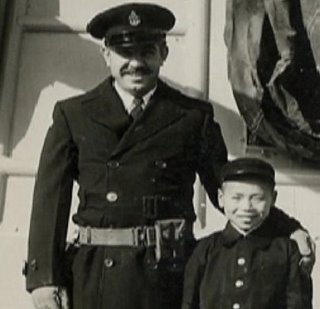 At one time, as a young child of about 6 or 8, I gave serious thought to my Dad being a spy for the Navy. I had no real proof, just old, creased and sepia photos from a long ago time before I was born of Dad, looking very much unlike the Dad I knew. Like this one (above). This was from who knows where, he was obviously on a ship, looking quite sharp in his full Navy officer garb, it must have been chilly or at least cold enough to be wearing that wool coat. The mustache is what threw me. This photo was of a series that me and my brother referred to as the "Stalin photos", simply because in our minds Dad looked like a ringer for Stalin with that big bushy 'stache. Mustaches in the Navy, at that time we thought was rather unusual, so we thought Dad must have been up to no goodnik. There's only a few photos of him looking like this.
At one time, as a young child of about 6 or 8, I gave serious thought to my Dad being a spy for the Navy. I had no real proof, just old, creased and sepia photos from a long ago time before I was born of Dad, looking very much unlike the Dad I knew. Like this one (above). This was from who knows where, he was obviously on a ship, looking quite sharp in his full Navy officer garb, it must have been chilly or at least cold enough to be wearing that wool coat. The mustache is what threw me. This photo was of a series that me and my brother referred to as the "Stalin photos", simply because in our minds Dad looked like a ringer for Stalin with that big bushy 'stache. Mustaches in the Navy, at that time we thought was rather unusual, so we thought Dad must have been up to no goodnik. There's only a few photos of him looking like this.My knowledge of world politics being very limited at that time, mostly restricted to old Warner Brothers propaganda cartoons from the 40's that occasionally ran on Saturday mornings, stealthy glimpses of Mad magazine (under threat of death by my brother-it was his stash) and leafing through old back issues of National Geographic magazines. (Which, as everyone knows, back in the 50's and early 60's it was a federal law that every household in America must have at least one years worth of those gathering dust somewhere in the house. A generous tax credit went to the household if you had at least one issue that featured either African tribeswomen or Amazon jungle women going about their day to day clad only in a scant handful of parrot feathers.)
Nevermind that the 'real' Stalin was a sawed-off, pockmarked squint of a psycho and my Dad would have towered over him at 5' 10", to my little kid eyes he looked "just like him"-further fueling the imagination. Why did Dad grow a mustache? What was going on here? The little Asian boy in this photo that my Dad has a fatherly arm around was a mystery, too. Why was he there and what was the connection? Dad had mentioned once in passing that sometimes 'locals'-the Chinese villagers would hire themselves out to do menial jobs for the American swabies while in port. Was that it? Was this kid my Dad's shoeshine boy? There's no date or anything on the back of this photo, as is the case with many of his Navy era photos. Further proof that something fishy was going on, to me anyway.
Yes, I know- Russia and China are 2 separate countries. Why would a Stalin stand-in be galavantin' about China? But as a kid I knew they were both Communist countries and therefore linked like peanut butter and jelly. But what I didn't know was back then, in Dad's time that wasn't the case...yet. China hadn't always been red. And it was during that ever so brief time in history when China was trying to fight off 2 threats-the Japanese invasion and the growing disgruntled hoardes that would eventually form Communist China that my Dad played a crucial role in. The thing is, it's takened almost 60 years after the fact to find out!
Dad never talked much about his time in the Navy, aside from a handful of humorous
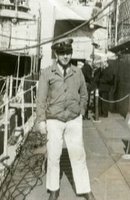 little stories that could have taken place anywhere in the world, since no real details were given -no names of the Navy buddies involved, not even nicknames. It was always "this guy I was with" or "this feller from the ship". Locations were vague, too. Often just said as "overseas" or "stateside". Well, that certainly narrows it down! Dad was a storyteller and a big practical joker. He could weave the most funniest tales of his pre-Navy past of exploits and pranks he pulled, going into great detail. But ask about his Navy times and you'd get the heavily censored, Reader's Digest version. So, it became a subject you just didn't bring up in family conversations. Dad had been in the Navy in the 30's and 40's, got out in the 50's, got a job as a mailman, put 10 bucks down on this cute little crackerbox of a house that we live in and that's all you needed to know. Naturally, for us kids this ban on the subject made us just want to know more...and caused us to fill in the gaps with our own wild fantasies.
little stories that could have taken place anywhere in the world, since no real details were given -no names of the Navy buddies involved, not even nicknames. It was always "this guy I was with" or "this feller from the ship". Locations were vague, too. Often just said as "overseas" or "stateside". Well, that certainly narrows it down! Dad was a storyteller and a big practical joker. He could weave the most funniest tales of his pre-Navy past of exploits and pranks he pulled, going into great detail. But ask about his Navy times and you'd get the heavily censored, Reader's Digest version. So, it became a subject you just didn't bring up in family conversations. Dad had been in the Navy in the 30's and 40's, got out in the 50's, got a job as a mailman, put 10 bucks down on this cute little crackerbox of a house that we live in and that's all you needed to know. Naturally, for us kids this ban on the subject made us just want to know more...and caused us to fill in the gaps with our own wild fantasies.Hence the theory that Dad was a Stalin double or on some other covert mission for our government. His recurrent bouts with malaria just added to the mystery.
Boy, I never knew that our imaginings would be so close to the truth.
Dad graduated from high school in Kentucky around 1938 or so. Shortly after that was when he joined the Navy. He was one of 4 brothers who would go on to serve in the military in that family. The 4 brothers all picked different branches: Navy, Engineer, Air Corps., and Medic Corps. Only 2 would see the end of WW2 and live to old age.
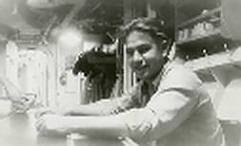
Anyway, I don't know exactly what year it was when Dad enlisted. But it was just shortly before the war-or at least our official involvement in it. I don't know where he did his basic, or where he was stationed. He had in the past mentioned ships by name, but some were so damn peculiar that it was tough to recall them, other than that one which was especially odd sounding became his password when ATM's finally came into being in the late 70's- the USS Gurke. Researching that name, I learned that this destroyer was deployed mostly after the war. As was the case with all the other destroyers he had mentioned in the past-these were ships he had served on after the war, in the 50's. Again...here we go with the 'top secret' crap! What ship was he on that took him to China? I've never been able to find out.
Finally, in the mid 70's Dad began to loosen up some. And it was then I began to see clues to his past. He had takened to wearing a white ballcap with a curious Naval patch on it, wore it everywhere, except church, of course. This ballcap had been a souvenier from a recent Navy reunion thing he and Mom had attended. Dad began to go to these things every year. They planned their regular annual trips back to Kentucky around this event. About this time a new little decal appeared above the D.O.D. sticker in the lower lefthand corner of the windshield of the family car. It was the same as the patch that was on his hat.
Dad was coming out.
It was time.
Dad had been a SACO guy.
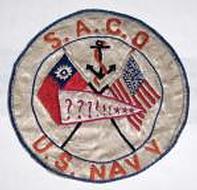
At the time this wasn't a huge revelation to me-I had hit my teens and I had other way more important things to concern myself with. The mysterious hero that my childs mind had created as my Dad became just my crabby and way too strict father who didn't know diddly. SACO-Schmacko...who gives a frig? I just want to know why I can't stay out on a Friday 'til past midnight, like all my friends?! Hey, I had my priorities then.
Luckily with age comes maturity and appreciation. But the childhood unspoken ban about asking Dad about his time in the Navy created a bad habit-even after it seemed ok to talk about it, I never did. Now that Dad has been 2 years gone I've been feeling this drive to find out. I knew now that this had been a top secret covert operation, but that was all I knew. I wanted to learn more...I wanted to know Dad's part in it all.
I've recounted the bits and pieces I've been able to dig up in past posts (here & here).
But I can see if I really want to try and discover the whole deal, it's gonna take alot of time and effort-as in applying to the National Archives for docs that have just recently been declassified and getting my hands on what few books are out there on the subject-the best known was a book entitled "The Rice Paddy Navy", but it is no longer in print-however, my extremely helpful uncle says he has a copy and will send it to me.
This trail has led me to finding out about the OSS, the China Naval Group and the precursor to the Navy SEALS-the group known as the Scouts & Raiders. I can't say for a certainty that Dad was part of that group. Their history states that the first newly trained men in that organization arrived in China for SACO in 1944. Dad's Naval Intelligence muster records show that he was already in China as early as 1942. The dates closely jibe with when SACO first began operations there. So, as near as I can figure, Dad was there for the entire 3 years plus that SACO operated in China! (The official story is that they were there for 40 months.) But yet, Dad is named in that post-war article as being part of the "Yangtze Raiders" and they are attributed as being a branch of the Scouts & Raiders. So this leaves some questions-if the S & R's didn't get there until 1944, then were the Yangtze boys a prototype to the precursor? From what I've been able to find out, the Yangtze Raiders were well under way before the S & R boys got there. Dad's looking like quite a trailblazer!
So, just what did my old man do in China?
The official cover story for SACO was that they were there to assist the Flying Tigers via establishing weather stations so they could have accurate and timely weather reports for their flights. And they did do that; but when they weren't setting up weather gizmos, the boys were busy in their off time blowing shit up! Like the unofficial slogan for NORAD-"Peace is our mission...war is our hobby." SACO's true mission was to make things as difficult as possible for the Japanese to gain a foothold in China under the auspices of the Nationalist China military. This meant sinking Japanese ships in Chinese ports and on the Yangtze River, blowing up bridges on known military transport routes, cutting communication lines, laying land and water mines, intercepting Japanese transmissions and just generally creating mayhem to mess with the Japanese heads. And it also meant training the Chinese civilians in the art of guerella warfare. The Americans fought side by side with the Chinese they helped train. In retrospect, I can't help but think of how many of those Chinese later went on to hone the skills that we taught them in the Red Army. I'm sure my Dad pondered that too...and I bet it really chapped his butt.
Dad once (and only once) told a story about what he did there. I was about 15 or so, this was after it had become officially ok to talk about SACO. He had been one of those guys training the civilians. In this particular case a large group had been assembled from far and wide from the little rural villages. This created a problem, because in China the language and dialects vary wildly in the remote rural areas, so Dad had a quartet of translators. The day's class would be on proper firearm handling, how to break down the rifle, how to load and aim, etc.
So Dad begins, the translators are lined up alongside him. He would say a sentence or two, hold up the rifle to demonstrate whatever point he was making and then wait as the translations worked their way down the line. As you can see, it was becoming one huge game of Telephone!
As Dad said, by the time he was done, for all he knew they could have thought he was telling them how to fry chicken!
But it must have worked, because SACO was credited with being a huge success in that area.
So Dad was a guerella tactics instructor. Cool. But thanks to that newspaper article my uncle sent me, I learned he did much more and I'm sure these missions appealed to his inner practical joker. That of cleverly laying mines that took the Japanese completely by surprize and confounded them as to how they were pulling it off.
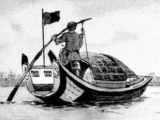
I'll excerpt some of the article here. The article is so old that online archives don't exist, so I'm having to type this down word for word. It's from an AP article dated Dec. ?, 1945-just a few months after the war. SACO is not named, since it didn't officially exist,
but there are enough clues there. The story is by Richard Johnston.
"Yanks Laid Innocent Looking Mines to Sink Jap Shipping"
' An innocent looking Chinese sampan nosed out from the bank of the middle of the Yangtze and began edging across the course of a 1,000 ton Japanese river frieghter, moving slowly upstream against the current.
Two innocent looking pieces of driftwood eddied away from the sampan, one to port of the frieghter, the other to starboard. The sampan inched into the reeds and willows on the opposite bank. The sharp prow of theJapanese frieghter cut between the chunks of driftwood and they mysteriously arched in against the ship's sides.
Thirty minutes passed. The frieghter neared a bend in the river and suddenly there was a muffled explosion and debris flew high. The ship careened crazily in the rushing muddy waters, rolled over and sank.
A day later, by secret transmitter, Joe Champe got word that his "boys" had sunk another enemy ship, using exactly 7 pounds of high explosive to do it.'
This Joe Champe was the commander of the Yanzte Raiders the article goes on to explain. I've tried to research him and have come up empty handed. The reporter calls him "the Navy's top saboteur". After recounting some other ambushes he planned and giving a brief background on him and the region where in China they operated (all valuable information, for me), Mr. Johnston goes on to explain how that ship got sunk
mid-way through the article. (Did you figure it out?) This is where I got a big ol' goofy smile on my face when reading this.
'It was there, in the late summer and fall of 1944, that Champe really got rolling.
With two of his men, Chief Electrician's Mate Charles Roberts of Hopkinsville, Ky. and Chief Torpedoman Joseph Bradley, another Kentuckian, they devised the "light charge" mine. It was simplicity itself.
The innocent sampan was the minelayer, of course. Each of the pieces of driftwood had a 3 1/2 lb. charge suspended by a slim wire beneath it, six feet under the water. The two floating chunks were in turn, linked together by a couple of hundred feet of invisible cable.
When the target ship hit the connecting cable the driftwood was pulled in against the sides of the ship. The charges then were detonated by a chemical timing device.
The Japanese, usually, never knew what hit them. And the fact the explosives were directly against the thin hull plates made them just as effective as huge mines.'
Boo-yah, Dad!!
Reading that just made me so damn happy, and that article alone has given me so much information to go on to continue my research. I can just see Dad with that big ol'toothy grin that I knew so well, laughing to himself when the ships blew: "That'll fix 'em!" These things had to be the ultimate practical joke for him, no doubt. It must have really pained him not to be able to brag about them. But I respect and admire that he did keep his word to his country and never said a thing, until the 25 year ban had passed. But even then he hardly would say much. He wouldn't even give up any info about the reunions for SACO guys he attended-like he shifted back into stealth mode when it came to those things. There's still alot I need to hunt up and will continue to try and find out more about Dad's service and what he did in SACO. But what I have been able to unearth for now is quite satisfying. SACO is one of those greatist stories never told type things, and in my own tiny way I want to try and document as much as I can, so the story doesn't disapear from history. Dad was very fond of the SACO boys and he was proud to have served with them. It's the least I can do to preserve and honor their memory by learning and documenting all that I can about the organization.
The newspaper article goes on to recount all the victories this unit achieved with using this clever ruse and other 'homemade' explosives and gives the enemy kill count for their raids which totalled into the thousands. It ends with this:
'...and when the war ended this August, Champe's boys had made the Yangtze a trickling brook and the railroads an ox cart trail as far as the Japanese were concerned.'
Happy Father's Day, Dad.
I won't forget.
I'm gonna watch "The Sand Pebbles" this afternoon, I know that was one of your favorites.








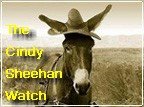
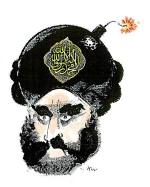







7 Comments:
This comment has been removed by a blog administrator.
Yum, what a scrumptious essay. Thank you. You had a wonderful dad.
A very interesting read Liz...I enjoyed the entire article. Glad you were able to piece together what you managed to...
I did try to intercede for you...I had a old friend who readily would have (and trust me...could have) gotten that info for me post-haste...but I called his office (Washington)...he had passed on...
Sorry lady...I tried....
Wow! GREAT post about your dad. I had no idea about that kind of operation and it is so great that you're learning about it. And, LOL, what a great picture. I don't blame you for making up stories about it!
I can't help thinking that those guys like your dad... they had the real juice. No one today seems to measure up.
Wow Pat..."scumptious"?? Now that's a word I would have never thought of. Thank you, I consider that high praise from a man whose writings I admire.
Yeah, my Dad was a card. I miss the ol' guy. He was a good Dad.
Cookie, that's the story of my life: A day late and a dollar short! I really do appreciate your efforts, though. That's awfully sweet of ya!
Walker- Yep, you betcha. They weren't labelled The Greatist Generation for nuthin'. After them, the euroweenification began in our culture and look where we're at! Not to denergrate our fighting troops now, but you have to admit, overall the values have degraded. There's still a few people who got the genes passed on, but not so many as there was then. The mindset was so different in those days...as was the media! Now that alone makes a big difference in attitude of a culture. There's no way we could pull off what we tried to do in China then now.
What a great essay. You have a lot to be proud of in your dad.
PS, The Sand Pebbles is one of my favorites too.
Thanks, Lem.
Y'know that scene at the end, when the foolish lefty missionary runs out into the courtyard waving his stupid little renouncement paper, thinking that will save him only to be gunned down in a hail of bullets?
My Dad would always hiss through his teeth: "Damn Jackass!" at that part.
(Dad would never swear out loud...only in whispered hisses.)
It's a strange film, in a way. I think Dad liked the whole look and feel of the movie. He always said it was just like that, even when he was there. And that was over 15 years after the time setting for that movie. I just find it interesting that the Nationalists who are so wickedly protrayed in the film would later become our allies in a sense, so soon after.
Post a Comment
<< Home